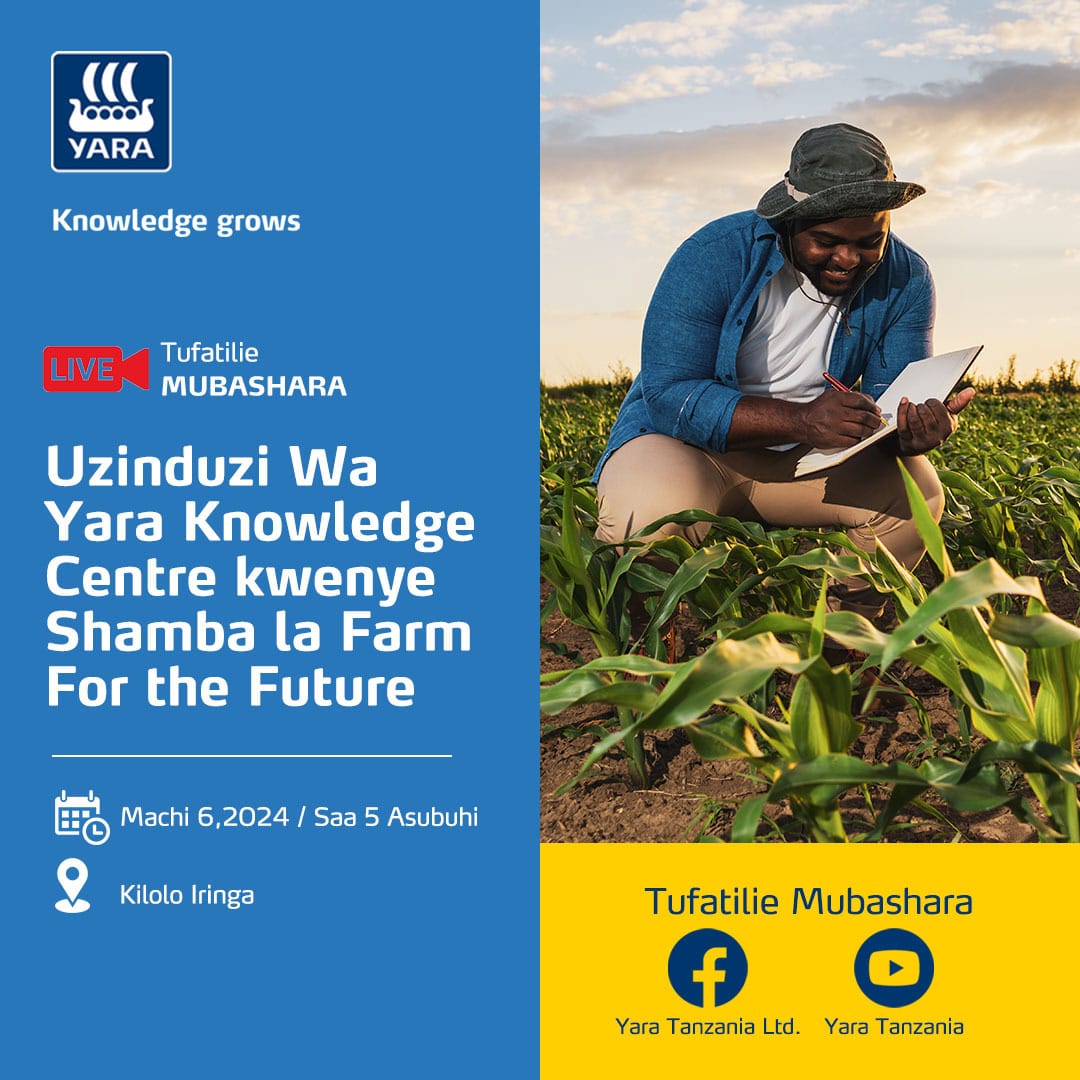By Kilimokwanza.org Team
In the SAGCOT area of Tanzania, a new chapter in sustainable agriculture and farmer empowerment is being written with the opening of the Yara Training Center in Iringa. This center, a joint venture with Farm For the Future (FFF) and Seed Co., signifies a major step in enhancing the proficiency of local farmers and contributing to sustainable farming practices in the region.
The center, located on a sprawling 350-hectare maize farm managed by FFF in Ilula district, was inaugurated by Iringa Regional Commissioner Ms. Halima Dendego, alongside the Norwegian Ambassador to Tanzania, Ms. Tone Tinnes. It aims to serve as a catalyst for government efforts to improve access to agricultural education and extension services, particularly for small-scale farmers facing challenges in crop nutrition and other production methods.
Mr. Winstone Odhiambo, the Managing Director of Yara Tanzania, remarked, “The Yara Training Center will be a trusted partner, providing small-scale farmers with education and skills through practical demonstrations, tools, and the necessary support to achieve sustainable farming, increase yields, and build successful livelihoods.”
The benefits of the Yara Training Center to farmers will include:
- Promoting better farming techniques such as soil health, proper crop nutrition, and environmental conservation for sustainable food production, thereby enhancing farmers’ profits.
- Enabling farmers to improve yields and facilitate access to farming inputs, knowledge, and innovative practices, including digital and modern technologies.
- Empowering small-scale farmers to increase household income within the framework of benefiting from research and development, agricultural value chains, and innovation.
- Establishing strong and lasting partnerships that foster trust among small-scale farmers who utilize high-quality products and services from Yara and other agricultural service providers.
The collaboration with Farm For the Future and Seed Co. to operate the Yara Training Center in Ilula is a practical testimony to the shared commitment to President Samia Suluhu Hassan’s agricultural transformation agenda. It aims to bridge the gap in the availability of subsidized inputs such as fertilizer support and extension services for the farmers in need. Mr. Odhiambo highlighted Yara’s continued commitment to advocating for soil health programs that enhance farmers’ resilience and contribute to sustainable agriculture for food security and farmer well-being.
The Iringa Center is one of seven Yara Training Centers located across the regions of Mbeya, Morogoro, Kilimanjaro, Tabora, Manyara, and Zanzibar, all of which foster strategic collaborations to promote more than just fertilizer sales, including financial assistance, pest control solutions, and soil testing technologies.
Osmund Ueland, the founder of Farm For the Future, mentioned that the addition of the Yara Training Center to their farm will accelerate their vision of making the project a model center for community development in Tanzania. “Our mission is to work with like-minded partners to enhance the program that lifts 2000 small-scale farmers out of poverty by 2030,” he said. He also urged the government to expedite its promise of providing three boreholes per village in the 16 villages surrounding the project, which he believes will boost irrigation farming.
Farm For the Future also implements a Children’s Demonstration Farm that includes horticulture and livestock farming for kindergarten and primary school students, an initiative that is now part of the Yara Training Center program to nurture the future generation of successful farmers.
The Executive Director of Seed Co. Limited, Mr. Clive Muganda, said: “Seed Co. will continue to support initiatives that drive the application of research and collective knowledge on soil health, environmental sustainability, and strengthening agricultural value chains for inclusive wealth production.”
Mr. Muganda praised the partnership of Seed Co. with Yara Tanzania and Farm For the Future to launch the Yara Training Center, which he believes will increase farmers’ resilience while contributing to food security and combating poverty among smallholder farmer communities.
Ms. Halima Dendego, the Iringa Regional Commissioner, commended the joint launch of the Yara Training Center by the three partners, noting that it would greatly help address the major challenges faced by farmers in the region to reach higher production levels. She listed some of the challenges facing farmers in the region, including a lack of agricultural education and inputs like fertilizer, poor infrastructure, affordable technology, pests and diseases, water source scarcity, market disruption, capital shortage, and harsh climatic conditions.
“I am delighted that the establishment of this training center aims to solve many of the challenges our farmers face, especially in providing extension services, crop nutrition solutions through research, and practical demonstrations. This unique collaboration between Yara Tanzania, FFF, and Seed Co. is an excellent example of private sector-led initiatives in strengthening our agriculture, which the government supports to achieve all the mentioned goals,” said Ms. Dendego.
Strategic Partnerships within the SAGCOT Centre Framework
Yara Tanzania, Farm For the Future, and Seed Co. have positioned themselves as partners within the Southern Agricultural Growth Corridor of Tanzania (SAGCOT) Centre, a collaborative initiative designed to improve agricultural productivity in the region. Through their synergistic partnership, these three entities are leveraging their collective expertise and resources to contribute significantly to the SAGCOT Centre’s mission of fostering inclusive and sustainable agricultural development.
By integrating their efforts within the SAGCOT Centre’s innovative framework, they not only drive the advancement of effective farming practices but also enhance food security and foster socio-economic growth among local communities. This tripartite alliance underlines the importance of strategic collaboration in scaling up agricultural transformation in the SAGCOT corridor, ensuring that small-scale farmers are empowered to not only improve their yields but also to become integral contributors to the national economy.
